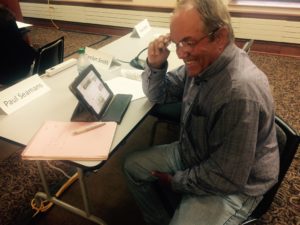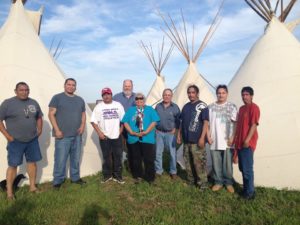Keystone XL Pipeline
CLICK HERE to write to the South Dakota Public Utilities Commission: Say NO on Keystone XL
Read the 50 Keystone XL permit conditions currently under review in South Dakota
Media coverage of South Dakota Keystone XL permit hearings
Statement from Dakota Rural Action Board Member and KXL landowner Paul Seamans:

TransCanada first appeared in the state in the spring of 2008, contacting landowners about the fact that a pipeline would be crossing their land. Soon thereafter, under the threat of eminent domain by TransCanada, these ranchers and farmers contacted Dakota Rural Action (DRA) for help in organizing against this threat. DRA has been there all along, assisting DRA members in their testimony at hearings with the Department of State and the Public Utilities Commission (PUC) permit hearings.
In those early days there were no thoughts of stopping Keystone XL; instead, DRA’s position was that we were working to obtain the safest possible pipeline. Since that time we have learned through meetings with the indigenous people of Alberta (First Nations) of the threats to the environment from tarsands development. The First Nations and the Lakota/Dakota/Nakota nations met, along with DRA members, to draw up the “Mother Earth Accord,” which seeks to stop tarsands development. DRA was one of the first signatories of this accord.
TransCanada’s Keystone XL Pipeline South Dakota Permit: http://www.puc.sd.gov/
On March 12, 2009, TransCanada filed for a pipeline permit with the South Dakota Public Utilities Commission. At that time, Dakota Rural Action organized crossed landowners under the Protect South Dakota Resources group. DRA intervened in the permit hearing, as well as one other organization and several individual landowners.
The permit was granted June 29, 2010. South Dakota Codified Law 49-41B-27 requires that if construction has not commenced within four years after a permit has been issued, the utility(in this case, TransCanada) must certify to the Commission that the facility continues to meet the conditions upon which the permit was granted.
As of June 30, 2014, TransCanada will not be able to do any work in South Dakota without going back to the Public Utilities Commission to certify their permit.
 TransCanada is right now in front of the Public Utilities Commission attempting to show they can meet the conditions of their original permit. They’re having some troubles, thanks to all the lawyers in the case (including ours) and the individual Lakotas, Dakotas, farmers, ranchers, and health professionals who intervened against Keystone XL.
TransCanada is right now in front of the Public Utilities Commission attempting to show they can meet the conditions of their original permit. They’re having some troubles, thanks to all the lawyers in the case (including ours) and the individual Lakotas, Dakotas, farmers, ranchers, and health professionals who intervened against Keystone XL.
We will continue to build relationships, organize, and protect our farms, ranches, and unique way of life in South Dakota.
For more information, contact Sabrina King at sabrina@dakotarural.org or 605.716.2200
History:
On the heels of the first Keystone project in Eastern South Dakota, oil transportation company TransCanada began to work on the Keystone XL pipeline proposal through Western South Dakota. The proposed Keystone XL pipeline will carry tar sands oil from Alberta to Texas, crossing an estimated 313 miles of South Dakota land, and an untold number of drinking and agriculture water sources.
Dakota Rural Action (DRA) has been working with landowners since 2008 to ensure that if Keystone XL does cross western SD, our land, water, and resources are protected, and it is not at a cost to the state and its people.
By organizing landowners along the route and extending our organizational efforts into Nebraska and Montana, DRA was able to form a democratically elected Landowner Negations Team to work in the groups’ interests in negotiations with TransCanada.
At the first meeting discussing the proposed pipeline in Reva, SD landowners were faced with a bleak future. The first Keystone project had been built with little or no attention paid to it and the outlook was similar for the newly proposed Keystone XL. One of the members attending the meeting said, if during the course of this debate we could make the President have to address this issue in front of the nation, we might have a chance to get a good decision. Now recent history shows protests in Washington with over 1,200 citizens being arrested in opposition to this pipeline.
Dakota Rural Action also assisted SD landowners in organizing the group, Protect South Dakota Resources, to share the burden of legal expenses among themselves and negotiate collectively with TransCanada. PSDR concluded negotiations with TransCanada in early 2011.
The final negotiated easement, though signed under ‘gag order,’ is a matter of public record and available at courthouses in the KXL affected counties in SD. The settlement can also be viewed here…Protect SD Resources Negotiated KXL Settlement
The final easement offer was lacking in many areas. During negotiations, TransCanada had unfair leverage due to the looming threat of eminent domain. Unfortunately when landowners were faced with the prospect of being taken through condemnation proceedings most ended up reluctantly signing on. However one DRA member has decided the threats are too large and has refused to sign a deal with TransCanada and is currently facing Eminent Domain charges.
DRA has been and continues to work with our landowner members to ensure that the issues and concerns raised by the Keystone XL pipeline proposal are recognized and addressed throughout the state and federal permitting processes, and through local ordinances and state legislation.
